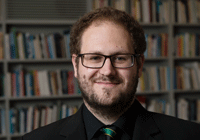
Photo credits:
Lars Wallin
Nicholas Zair
Pro Futura Scientia Fellow, SCAS.
Senior Lecturer in Classics (Classical Linguistics and Comparative Philology), University of
Cambridge
Nicholas Zair read Literae Humaniores (Classics) as an undergraduate, followed by an MPhil and DPhil
in Comparative Philology and General Linguistics, at Merton and Jesus Colleges, Oxford. He became a
Research Fellow at Peterhouse, Cambridge in 2010, and subsequently worked on the AHRC-funded
‘Greek in Italy’ project at Cambridge. He was appointed Lecturer in 2016 and Senior Lecturer in 2020.
His DPhil thesis on The Reflexes of the Proto-Indo-European Laryngeals in Celtic was awarded the
Johann Kaspar Zeuß Prize of the Societas Celtologica Europaea and was published by Brill in 2012.
His second monograph, on Oscan in the Greek Alphabet, was published by Cambridge University Press
in 2016. This book examined how speakers of Oscan, a language related to Latin and spoken in south-
ern Italy c. 400–50 BC, wrote their language when using the Greek alphabet. The book provided new
evidence for the sound system of Oscan and argued that the spelling rules were primarily decided on
an individual basis by writers, rather than reflecting a centralised tradition.
Zair has written a number of articles and book chapters about the morphology, phonology and writing
systems of the Celtic and Italic language families. As a Pro Futura Fellow, he is working on a monograph
on ‘Spelling and Sub-elite Education in the Roman Empire’. This investigates the use of certain ortho-
graphic features in sub-elite corpora, in order to assess the kind of education that the writers of these
texts
received. It appears that members of the Roman sub-elite had received an education more like that
of the
upper classes than might be expected – at least as regards spelling.
This information is accurate as of the academic year 2021-22.






